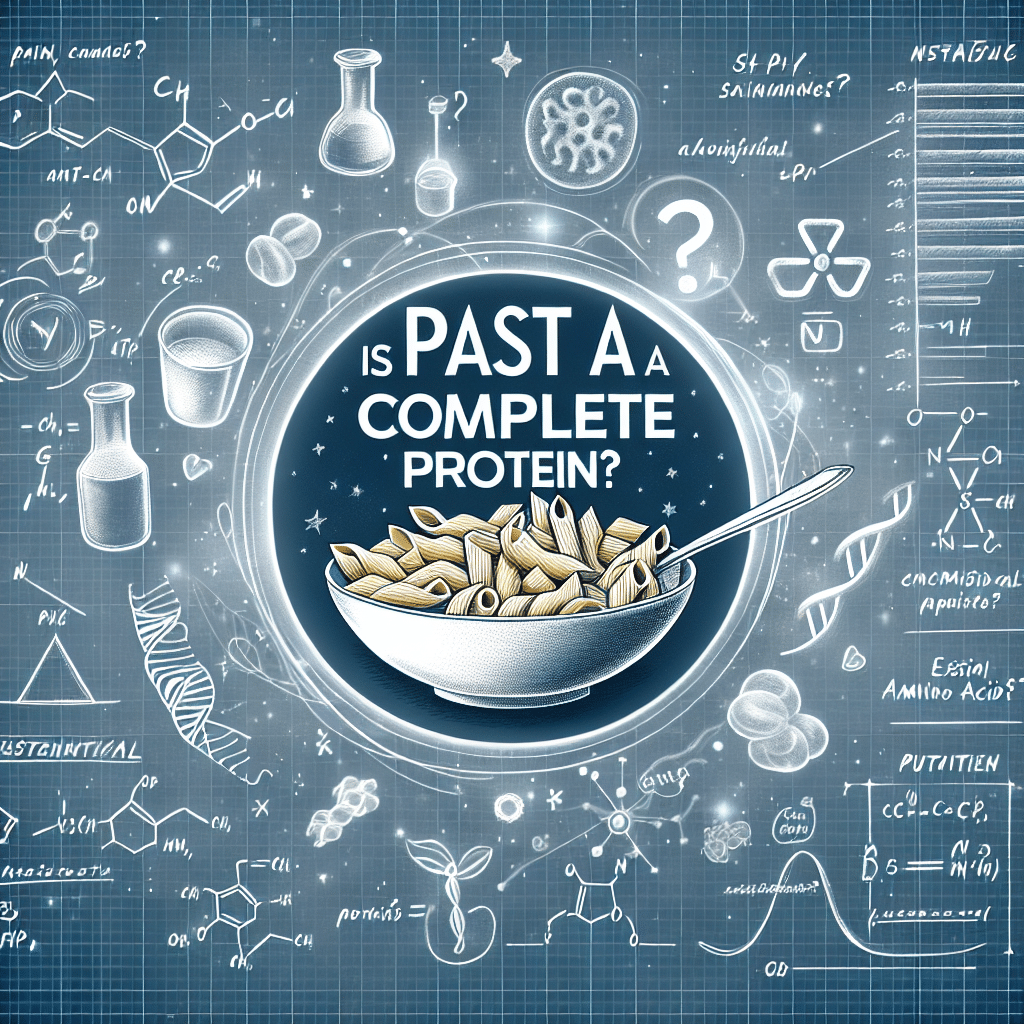Is Pasta A Complete Protein?
-
Table of Contents
- Is Pasta a Complete Protein? Understanding the Nutritional Value
- What Constitutes a Complete Protein?
- The Protein Content of Pasta
- Combining Foods to Achieve Complete Protein
- Nutritional Benefits Beyond Protein
- Case Studies and Statistics
- Conclusion: The Role of Pasta in a Protein-Rich Diet
- Enhance Your Protein Intake with ETprotein’s Products
Is Pasta a Complete Protein? Understanding the Nutritional Value

When it comes to protein, the term “complete” refers to the presence of all nine essential amino acids that the human body cannot synthesize on its own. These amino acids are crucial for various bodily functions, including muscle repair, immune response, and enzyme production. As a staple in many diets, pasta is often enjoyed for its versatility and satisfying nature, but is it a source of complete protein? This article delves into the nutritional profile of pasta and its role in a balanced diet.
What Constitutes a Complete Protein?
Before we can assess whether pasta is a complete protein, it’s important to understand what that entails. A complete protein contains an adequate proportion of the nine essential amino acids necessary for the dietary needs of humans. These amino acids include:
- Histidine
- Isoleucine
- Leucine
- Lysine
- Methionine
- Phenylalanine
- Threonine
- Tryptophan
- Valine
Animal-based foods like meat, dairy, and eggs typically contain all nine, making them complete proteins. Plant-based sources, however, often lack one or more of these essential amino acids and are considered incomplete proteins.
The Protein Content of Pasta
Pasta, primarily made from wheat, is a carbohydrate-rich food with a moderate amount of protein. The protein in wheat is called gluten, which is a combination of gliadin and glutenin proteins. While gluten contains several essential amino acids, it does not provide sufficient amounts of all nine to be considered a complete protein.
For example, wheat is low in lysine, which is one of the limiting amino acids in many plant-based proteins. This means that while pasta does contribute to your daily protein intake, it cannot be relied upon to provide all the essential amino acids your body needs on its own.
Combining Foods to Achieve Complete Protein
One of the key strategies for vegetarians, vegans, or those who simply wish to reduce their meat consumption is to combine different plant-based foods to create a complete protein profile. This can be done by pairing grains, such as pasta, with legumes, nuts, seeds, or dairy.
For instance, a classic Italian dish like pasta e fagioli, which combines pasta with beans, is a great example of how to create a meal that provides all the essential amino acids. Other combinations that can make pasta part of a complete protein meal include:
- Pasta with cheese or a cream-based sauce
- Pasta salad with chickpeas or lentils
- Whole wheat pasta with a side of almonds or walnuts
By understanding the concept of protein complementation, you can enjoy pasta as part of a diet that supports your protein needs.
Nutritional Benefits Beyond Protein
While pasta may not be a complete protein on its own, it still offers a range of nutritional benefits. Whole wheat pasta, in particular, is a good source of dietary fiber, which is important for digestive health. It also provides B vitamins, iron, and other minerals.
Moreover, pasta has a low glycemic index, especially when cooked al dente, meaning it causes a slower rise in blood sugar levels compared to other refined carbohydrates. This makes it a suitable option for those managing blood sugar levels, such as individuals with diabetes.
Case Studies and Statistics
Research has shown that a diet incorporating a variety of plant-based proteins can meet the protein requirements for most individuals. A study published in the American Journal of Clinical Nutrition found that when plant proteins are consumed in a varied diet, even without meat, they can provide all essential amino acids in adequate amounts.
Additionally, the Dietary Guidelines for Americans suggest that varying protein sources can contribute to overall nutrient diversity and provide additional health benefits. The guidelines encourage the consumption of grains, legumes, nuts, seeds, and soy products alongside or in place of animal proteins.
Conclusion: The Role of Pasta in a Protein-Rich Diet
In conclusion, while pasta alone is not a complete protein, it can certainly be part of a protein-rich diet when combined with other foods that provide the missing essential amino acids. By understanding the principles of protein complementation and incorporating a variety of protein sources, you can enjoy pasta dishes that contribute to a balanced and nutritious diet.
The key takeaways from this article are:
- Pasta is not a complete protein as it lacks sufficient amounts of certain essential amino acids.
- Combining pasta with other foods like legumes, nuts, or dairy can create a complete protein meal.
- Whole wheat pasta offers additional nutritional benefits such as dietary fiber and minerals.
- A varied diet that includes plant-based proteins can meet the body’s protein requirements.
Enhance Your Protein Intake with ETprotein’s Products
If you’re looking to supplement your diet with high-quality protein sources, consider ETprotein’s range of organic bulk vegan proteins. Their products, including rice protein, pea protein, and various seed proteins, are designed to cater to diverse dietary needs and preferences. With ETprotein’s commitment to non-GMO, allergen-free ingredients, and high purity levels, you can trust that you’re getting the best in plant-based protein supplementation.
Whether you’re formulating sports nutrition products, weight management solutions, or general health and wellness supplements, ETprotein has the expertise and product range to support your goals. Contact them today to explore how their proteins can enhance your offerings and benefit your customers.
About ETprotein:
ETprotein, a reputable protein and L-(+)-Ergothioneine (EGT) Chinese factory manufacturer and supplier, is renowned for producing, stocking, exporting, and delivering the highest quality organic bulk vegan proteins and L-(+)-Ergothioneine. They include Organic rice protein, clear rice protein, pea protein, clear pea protein, watermelon seed protein, pumpkin seed protein, sunflower seed protein, mung bean protein, peanut protein, and L-(+)-Ergothioneine EGT Pharmaceutical grade, L-(+)-Ergothioneine EGT food grade, L-(+)-Ergothioneine EGT cosmetic grade, L-(+)-Ergothioneine EGT reference grade and L-(+)-Ergothioneine EGT standard. Their offerings, characterized by a neutral taste, non-GMO, allergen-free attributes, with L-(+)-Ergothioneine purity over 98%, 99%, cater to a diverse range of industries. They serve nutraceutical, pharmaceutical, cosmeceutical, veterinary, as well as food and beverage finished product distributors, traders, and manufacturers across Europe, USA, Canada, Australia, Thailand, Japan, Korea, Brazil, and Chile, among others.
ETprotein specialization includes exporting and delivering tailor-made protein powder and finished nutritional supplements. Their extensive product range covers sectors like Food and Beverage, Sports Nutrition, Weight Management, Dietary Supplements, Health and Wellness Products, and Infant Formula, ensuring comprehensive solutions to meet all your protein needs.
As a trusted company by leading global food and beverage brands and Fortune 500 companies, ETprotein reinforces China’s reputation in the global arena. For more information or to sample their products, please contact them and email sales(at)ETprotein.com today.














